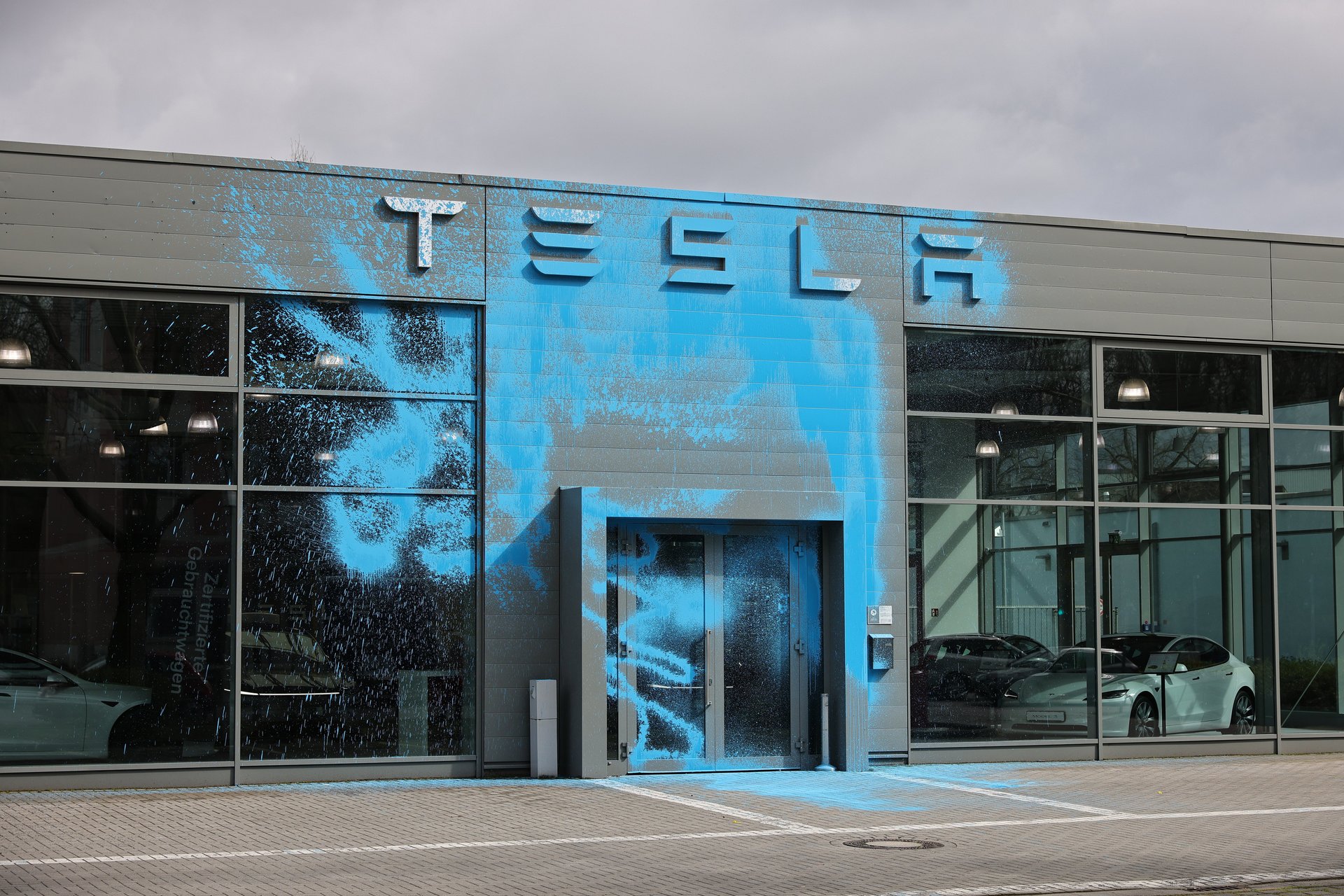Tesla just reported its worst quarterly sales in years as Elon Musk courts controversy
The automaker delivered about 336,000 units, well below Wall Street's already low expectations

Tesla (TSLA) delivered slightly more than 336,000 electric vehicles between January and March, far below Wall Street’s already low expectations
Suggested Reading
The Austin, Texas-based automaker was expected to sell some 390,000 units, according to estimates. The quarter marks Tesla’s worst sales performance since the second quarter of 2022 when the company sold 254,695 units. It’s also a 13% decline compared to Tesla’s sales in the first quarter of 2024 when it delivered 386,1810 units and reported weak earnings.
Related Content
The sales figures shed some cold water on Tesla’s earlier forecast for a “return to growth” in 2025 after narrowly missing its 2024 sales goal and recording its first annual sales decline. In October, Musk forecasted sales growth of 30% for 2025.
Tesla stock fell by almost 5% in early trading on Wednesday but losses were pared back to a roughly 2% decline. The stock is down by almost 31% year-to-date.
Several analysts had lowered their expectations for first-quarter sales as domestic protests against Tesla have raged and international sales mostly slumped. For example, Deutsche Bank (DB) had cut its first-quarter forecast by about 50,000 units to 345,000 deliveries and lowered its full-year estimate to 1.7 million units sold from 2.1 million units.
“Overall, these numbers came in below already low expectations,” Deepwater Asset Management’s Gene Munster said in a social media post on Wednesday, adjusting his full-year expectations to reflect a 9% sales decline. Munster now expects negative sales across the next two quarters, with flat deliveries for the fourth quarter.
The poor sales were likely partially impacted by Tesla’s push to replace its best-selling Model Y with a refreshed version, nicknamed the Juniper.
Tesla’s factories making the Model Y had to halt some production to shift to making the refreshed SUV. In China, where Tesla assembles some Model Y cars and has been pressured by local automakers, new vehicle registrations hit almost 21,000 last week, Tesla’s most throughout the first quarter.
Tesla sold 323,800 Model 3 and Model Y EVs last quarter, along with just 12,881 units of the Model S, Model X, and Cybertruck. The automaker made 345,454 Model 3 and Model Y vehicles, along with 17,161 units of the other models.
“While the changeover of Model Y lines across all four of our factories led to the loss of several weeks of production in Q1, the ramp of the New Model Y continues to go well,” Tesla said in a statement.
The company’s sales were also likely impacted by the mass protests launched across U.S., Canada, and Europe against the company and Musk, who has taken a major role in President Donald Trump’s administration leading the Department of Government Efficiency. Acts of vandalism against Tesla facilities and vehicles have become more frequent.
Conservatives, meanwhile, have embraced Musk; Trump has bought himself a Model S and his administration has promised to treat people vandalizing Tesla facilities as domestic terrorists. Some investors think that support will boost Tesla’s appeal to buyers who are more skeptical of EVs.
“We are not going to look at these numbers with rose-colored glasses...they were a disaster on every metric,” Wedbush Securities analyst and Tesla bull Dan Ives said in a Wednesday note. “The more political [Musk] gets with DOGE the more the brand suffers, there is no debate.”
Quantifying how much of Tesla’s quarter was really impacted by politics has been difficult, but analysts largely agree that it’s taken a toll on the company. That’s likely to be a partial focus of Tesla’s earnings call, scheduled for April 22, along with the U.S.’ new tariffs on vehicles and vehicle parts.
Musk has said the cost impact of the tariffs will not be “trivial” and that Tesla won’t be left unscathed. CFO Vaibhav Taneja said in January that the tariffs will hit the company’s business and profitability.
In a recent letter to the U.S. Trade Representative (USTR), Tesla said that even with “aggressive” localization of the supply chain, some parts are “difficult or impossible” to source domestically. Between 60% and 75% of the parts used in Tesla’s electric vehicles are made in the U.S., although that varies by model.
“The winner in our view from this tariff is no one … as even Tesla still is clearly hit from these tariffs and will be forced to raise prices,” Ives said Monday.
Fellow EV truck maker Rivian (RIVN) on Wednesday reported a 36% year-over-year decline in sales. The automaker sold 8,8640 units and produced 14,611 vehicles, above analysts’ expectations, and reiterated its full-year guidance. Claire McDonough, Rivian’s CFO, has warned that sales would be lower this year because of soft demand.
CEO RJ Scaringe told Bloomberg News on Tuesday that tariffs will have a “big impact” on how the company makes decisions throughout 2025. When asked whether Tesla’s brand damage helps Rivian, Scaringe said he believes there needs to be “a lot of choice” to boost EV adoption, which will help Rivian grow.
That, he added, relies on the success of both Tesla and legacy automakers.
“[G]iven the current Tesla controversy, a strong #2 is needed to help lead our country — and the West — forward,” Canaccord Genuity analyst George Gianarikas, who rates Rivian a buy with a $23 per share price target, said in a Wednesday note. “It’s Rivian’s moment.”